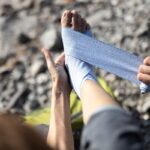For current or aspiring medical professionals, the unique and exhilarating challenges of a career in extreme medicine offer the chance to make an impact on global health while enjoying a life of adventure. Providing critical care in hostile or austere environments, ranging from disaster zones to remote wildernesses, pushes you to test your skills, adaptability, and resilience.
If you’re excited to learn more about this career path, here’s an overview of extreme medicine, the role it plays in public health, and whether it’s the right fit for you.
How to Provide Medical Care in Extreme Environments
Extreme medicine is the practice of delivering medical care in unconventional and challenging environments, such as conflict regions, disaster zones, remote wildernesses, or extreme weather conditions.
“It’s taking medicine outside of hospitals and applying it to low-resource environments,” says Professor Mark Hannaford, DSc, founder of World Extreme Medicine. The extreme medicine organization combines traditional healthcare expertise with specialized knowledge of emergency management and wilderness survival so medical professionals can adapt their treatment strategies to different circumstances.
“We train medical professionals to work in remote, low-resource environments, which are at times dangerous,” explains Hannaford. This is particularly important in both wilderness and expedition medicine—two subsets of extreme medicine—where medical professionals have to manage emergency care and search and rescue operations in areas that may be difficult to reach or filled with obstacles, such as rough terrain, poor weather, or avalanches.
While the field is all about preparing for a crisis, Hannaford points out that a need for extreme medicine can arise at any time. “Anywhere from space, to Antarctica, to climbing on Everest, to refugee camps in Syria, to working in the Ukraine. Anywhere can be an extreme environment given the circumstances,” says Hannaford.
For example, if you’re based in Boston and your vehicle gets stranded in the middle of nowhere in the winter, you too are at risk of getting frostbite and hypothermia. All of a sudden you’re going to want somebody who knows what they’re doing in those types of environments.
“It’s closer to home than people think, but it’s as far away as you can imagine at the same time,” concludes Hannaford.
The Role of Extreme Medicine in Emergency Situations
Extreme medicine mitigates the negative impact of extreme emergencies by ensuring medical aid reaches isolated communities, inaccessible regions, or disaster-stricken areas promptly. In extreme scenarios, conventional healthcare systems may struggle to operate effectively, and healthcare providers must be able to implement better strategies as quickly as possible.
In addition, extreme medicine training touches on global trends that are equally important in effective care. “With the threats of climate change and overpopulation, we are going to need medics who are able to provide high levels of medical care outside of hospital environments more and more,” adds Hannaford.
Even areas well equipped with skilled physicians and medical technology can encounter new public health threats they aren’t well prepared to manage. “COVID is the perfect example,” Hannaford remarks. “In the UK, the extreme medics were the only people in the hospital systems who had any knowledge of working in a large-scale public health environment and who knew hospitals themselves were going to be a hotbed of contagion if they didn’t get their systems right.”
Taking a proactive approach to extreme medicine can prevent secondary health issues and infections, reduce suffering, and increase the chances of successful recovery.
As an added benefit, the lessons healthcare professionals learn in emergency situations help improve disaster preparedness methods, train fellow medics, educate the public, and patient outcomes. “I think it’s also important for mainstream clinical careers and for hospital systems,” Hannaford says, “because it’s producing medics that are able to think on their own and problem-solve.”
The highest priority for extreme medicine professionals is reducing mortality rates. Since it’s impossible to predict or prevent every scenario, it’s more important for healthcare providers to have the skills and confidence to be resourceful at a moment’s notice.
“You can train as much as you’d like and have a plan, but it never turns out how you expect it to,” Hannaford points out. “But training gives you the ability to problem-solve and the security to know you’re making decisions based on the latest clinical evidence.”
No matter what subsect of extreme medicine you choose, it’s crucial to be both self-sufficient and good at collaborating with others. “You are virtually never working by yourself, so you have to be a team player,” Hannaford adds. “However, you might be the only medic which also makes it quite isolated at times.”
Medics need to have enough situational awareness to manage their own personal safety while also assessing injuries, identifying risks, and communicating in multidisciplinary teams. And when traditional resources are unavailable, emergency medics have to think quickly to come up with medical techniques that are doable under the current conditions.
How to Find a Career in Extreme Medicine
To begin building a career in extreme medicine, aspiring professionals should explore their interest in both medicine and adventurous environments. Understanding the challenges and unique demands of extreme medical work is essential before investing in specialized education. It’s also beneficial to compare different types of extreme medicine and common conditions you can expect when working in specific environments.
If you don’t have a health background, getting medical education in a relevant field is essential. Professionals who already work in healthcare fields can start transitioning by volunteering in emergency response settings or taking immersive extreme medicine courses to build targeted skill sets. For instance, wilderness training programs can provide fundamental outdoor survival skills that are applicable to every other type of extreme medicine.
Programs like Northeastern’s Graduate Certificate in Extreme Medicine are designed to build upon your existing medical knowledge with skills like crisis management, emergency response, and wilderness preparedness.
“There are doors that will open as a result of doing this,” says Hannaford. “We’ve seen it happen innumerable times because there’s nothing else. This is so new that people will speak to you and could even help you get a foot in the door.”
Nothing is more useful than hands-on field experience and mentorship from seasoned professionals, so it’s advantageous to get real-world training right away. “The more you train, the better you’re going to operate. The more you train, the more people you meet, and the more opportunities you make as a result. This means you’ll have more friends and colleagues in this space who can help, advise, and support you,” says Hannaford.
As you research career paths, consider which functions you want to perform as part of an emergency medical team. A variety of medical and allied health roles are available in extreme medicine, such as doctors, nurses, paramedics, dentists, dietitians, and psychiatrists. Aspiring professionals have multiple options for entering the extreme medicine field at different levels, offering flexibility in terms of how and when you want to pursue more education.
Networking and being flexible will also come in handy as you explore career options. Building relationships, attending workshops, and practicing in different extreme environments sets you apart as someone who’s committed to growing as a healthcare provider. “There are lots of areas of medicine that are rewarding, but I think extreme medicine is rewarding because you have grand adventures and have experiences you wouldn’t normally have,” Hannaford adds.
Start a Career in Extreme Medicine
As an emerging field, extreme medicine offers a world of opportunities to medical professionals who are ready to embrace the unknown and have a passion for delivering effective healthcare. Extreme medicine pushes the boundaries of traditional healthcare, and, as a result, practitioners in this field must learn to trust their knowledge and instincts to effectively navigate unfamiliar challenges in healthcare.
To achieve that level of confidence and preparedness, extreme medicine professionals need in-depth training on navigating harsh environments and an understanding of human psychology of operating in extremes.







Related Articles
4 Pressing Global Health Problems We Face Today
Global Health Careers: How Can I Make a Difference?
Compliance Specialists: Who They Are and What They Earn